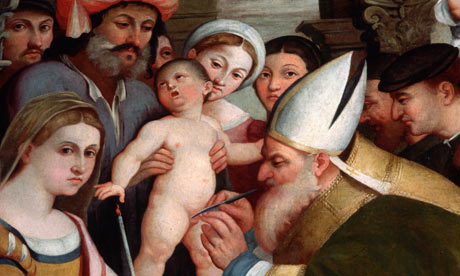A German court has rejected identity and history in favour of a liberal concept of choice, but there's more to right and wrong

'Circumcision is the way Jewish and Muslim men are marked out as being involved in a reality greater than themselves.' Detail of Circumcision of Jesus Christ by Pellegrino da San Daniele Photograph: Elio Ciol/Corbis
In November 2010, a Muslim doctor in Germany carried out a circumcision on a four-year old-boy at the request of his parents. A few days later the boy started bleeding and was admitted to Cologne's University hospital who reported the matter to the police. Last month, after a lengthy legal battle, a judge in Cologne outlawed male circumcision as being against the best interests of the child.
Muslim and Jewish groups have been understandably outraged. This week, Germany's chancellor Angela Merkel set herself against the court ruling by telling members of her CDU party that "I do not want Germany to be the only country in the world in which Jews cannot practise their rites." It beggars belief that a German chancellor ought to have to utter such a sentence.
Yet the circumcision of babies cuts against one of the basic assumptions of the liberal mindset. Informed consent lies at the heart of choice and choice lies at the heart of the liberal society. Without informed consent, circumcision is regarded as a form of violence and a violation of the fundamental rights of the child. Which is why I regard the liberal mindset as a diminished form of the moral imagination. There is more to right and wrong than mere choice.
Indeed, making choice the gold standard in every circumstance is to concede to the moral language of capitalism.
I was circumcised by the mohel when I was eight days old on my grandmother's kitchen table in St John's Wood. It wasn't done for health reasons. It was a statement of identity. Whatever is meant by the slippery identification "being Jewish" – my father is, my mother is not – it had something to do with this. Circumcision marked me out as belonging. Years later, when my wife objected to the circumcision of our new son on the grounds that it was cruel and unnecessary, I reluctantly gave way. Intellectually, I knew that there was little left of "being Jewish" to protect. After all, my wife was not Jewish and I had become a Christian priest. Halachically, it made no sense.
For all of this, I still find it difficult that my son is not circumcised. The philosopher Emil Fackenheim, himself a survivor of Sachsenhausen concentration camp, famously added to the 613th commandments of the Hebrew scriptures with a new 614th commandment: thou must not grant Hitler posthumous victories. This new mitzvah insisted that to abandon one's Jewish identity was to do Hitler's work for him. Jews are commanded to survive as Jews by the martyrs of the Holocaust. My own family history – from Miriam Beckerman and Louis Friedeburg becoming Frasers (a name change to escape antisemitism) to their grandson becoming Rev Fraser (long story) to the uncircumcised Felix Fraser – can be read as a betrayal of that 614th commandment.
And I have always found this extremely difficult to deal with. On some level, I feel like a betrayer.
As I argued in this week's Church Times, one of the most familiar modern mistakes about faith is that it is something that goes on in your head. This is rubbish. Faith is about being a part of something wider than oneself. We are not born as mini rational agents in waiting, not fully formed as moral beings until we have the ability to think and choose for ourselves. We are born into a network of relationships that provide us with a cultural background against which things come to make sense. "We" comes before "I". We constitutes our horizon of significance. Which is why many Jews who consider themselves to be atheists would still consider themselves to be Jewish. And circumcision is the way Jewish and Muslim men are marked out as being involved in a reality greater than themselves.
This, however, is a complete anathema to much modern liberal thought that narrows religious and ethical language down to the absolute priority of personal autonomy and individual choice. Liberalism constitutes the view from nowhere. Liberalism has no sense of history. And it is because the Cologne court had so little sense of history that it made such a ridiculous and offensive decision.

No comments:
Post a Comment